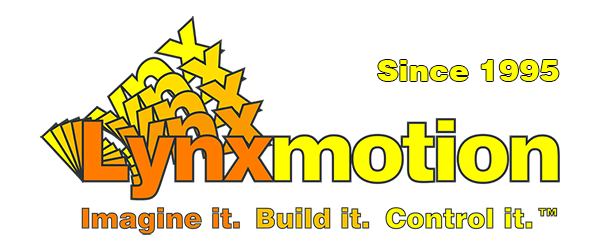Wiki source code of LSS-PRO Configure IDs
Last modified by Coleman Benson on 2024/10/08 12:52
Hide last authors
 |
23.1 | 1 | (% style="width:710px" %) |
| 2 | |(% colspan="2" %)((( | ||
 |
25.1 | 3 | == LSS-PRO Configure IDs == |
 |
23.1 | 4 | ))) |
| 5 | |(% style="width:25px" %) |((( | ||
| 6 | ~1. Wiring | ||
 |
2.2 | 7 | |
 |
27.1 | 8 | __WARNING:**Do not hot plug the servo!** Make sure the power supply is turned OFF (and waited at least 10s for it to completely discharge its internal capacitor) before connecting it to the LSS-P actuator__ |
 |
2.2 | 9 | |
 |
4.1 | 10 | * ((( |
| 11 | Connect the XT60 from your power supply | ||
| 12 | ))) | ||
| 13 | * Connect the USB Type-C cable | ||
 |
27.1 | 14 | |
| 15 | If you are using a battery, ensure there is an On/Off switch between the battery and the servo(s). | ||
 |
23.1 | 16 | ))) |
| 17 | | |((( | ||
 |
27.1 | 18 | 2. Power ON |
 |
2.2 | 19 | |
 |
27.1 | 20 | * Power the actuator (set the switch to ON) |
 |
23.1 | 21 | ))) |
| 22 | | |((( | ||
| 23 | 3. LSS PRO Config Software | ||
 |
4.1 | 24 | |
 |
23.1 | 25 | * Install the LSS PRO Configuration software ([[HERE>>path:/info/wiki/lynxmotion/view/ses-pro/lss-pro/lss-p-configuration-software/]]) |
 |
4.1 | 26 | * Open the LSS PRO Configuration software |
 |
21.1 | 27 | |
 |
24.1 | 28 | [[image:ses-pro.lss-pro.lss-p-configuration-software.lss-p-config-configure-ids.WebHome@LSS-P-ID-Config-Open.png]] |
 |
23.1 | 29 | ))) |
| 30 | | |((( | ||
 |
27.1 | 31 | 4. Connect to the BUS |
 |
5.1 | 32 | |
 |
27.1 | 33 | * Select the COM port associated with your actuator or the first servo in the BUS |
 |
4.1 | 34 | * Click Connect |
| 35 | |||
 |
24.2 | 36 | [[image:ses-pro.lss-pro.lss-p-configuration-software.lss-p-config-configure-ids.WebHome@LSS-P-ID-Config-COM.png]] |
 |
23.1 | 37 | ))) |
| 38 | | |((( | ||
| 39 | 5. Actuator Selection | ||
 |
5.1 | 40 | |
 |
4.1 | 41 | * In the drop-down menu, select your actuator |
| 42 | |||
 |
24.2 | 43 | [[image:ses-pro.lss-pro.lss-p-configuration-software.lss-p-config-configure-ids.WebHome@LSS-P-ID-Config-Select.png]] |
 |
23.1 | 44 | ))) |
| 45 | | |((( | ||
 |
27.1 | 46 | 6. Set the servo's ID |
 |
16.1 | 47 | |
 |
27.1 | 48 | * In the "Configuration" drop-down menu, select the **C**onfigure **ID** command "CID / ID Number" |
 |
16.1 | 49 | |
 |
24.2 | 50 | [[image:ses-pro.lss-pro.lss-p-configuration-software.lss-p-config-configure-ids.WebHome@LSS-P-ID-Config-CID.png]] |
 |
16.1 | 51 | |
 |
27.1 | 52 | * In the text entry box, set the desired ID number (integers only up to 253) |
 |
16.1 | 53 | |
 |
24.2 | 54 | [[image:ses-pro.lss-pro.lss-p-configuration-software.lss-p-config-configure-ids.WebHome@LSS-P-ID-Config-ID1.png]] |
 |
16.1 | 55 | |
 |
27.1 | 56 | * Click on the "Send" button to send the command to the servo |
 |
16.1 | 57 | |
 |
24.2 | 58 | [[image:ses-pro.lss-pro.lss-p-configuration-software.lss-p-config-configure-ids.WebHome@LSS-P-ID-Config-Send.png]] |
 |
16.1 | 59 | |
 |
27.1 | 60 | * The "RESET" button will start blinking, click on it to reset the servo |
 |
4.1 | 61 | |
 |
24.2 | 62 | [[image:ses-pro.lss-pro.lss-p-configuration-software.lss-p-config-configure-ids.WebHome@LSS-P-ID-Config-Reset.png]] |
 |
23.1 | 63 | ))) |
| 64 | | |((( | ||
| 65 | 7. Confirm | ||
 |
16.1 | 66 | |
 |
27.1 | 67 | * The software will automatically re-connect to the actuator but if not, proceed as done in Step 4 |
| 68 | * Verify that your ID is not what you have set | ||
 |
5.1 | 69 | |
 |
24.2 | 70 | [[image:ses-pro.lss-pro.lss-p-configuration-software.lss-p-config-configure-ids.WebHome@LSS-P-ID-Config-ID1-Confirm.png]] |
 |
16.1 | 71 | |
 |
4.1 | 72 | At that point your Actuator should have the new ID configured. |
 |
23.1 | 73 | ))) |
 |
27.1 | 74 | | |8. Repeat individualls for each servo in the BUS ensuring only one servo at a time is connected via its own USB to the software. |

